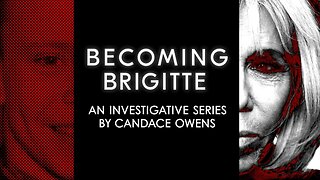Premium Only Content

Programmed to Kill: The Politics of Serial Murder by David McGowan (2004)
Programmed to Kill: The Politics of Serial Murder by David McGowan, first published in 2004, is a controversial exploration of the darker side of serial murders and their potential links to government and institutional power. McGowan delves into the possibility that many high-profile serial killers may have been manipulated or "programmed" by powerful entities, using them as tools for broader, covert political agendas.
The book challenges conventional narratives about serial killers by suggesting that these individuals might not be acting solely out of personal psychopathy but could be the result of mind control experiments, psychological conditioning, or other forms of manipulation orchestrated by clandestine forces. McGowan investigates the backgrounds of numerous serial killers, uncovering strange coincidences, inconsistencies in official reports, and possible connections to military or intelligence organizations.
McGowan's work ties together various strands of conspiracy theory, including MKUltra, a CIA program known for its mind control experiments, and the alleged involvement of secret societies in shaping the actions of individuals for their purposes. The book raises questions about the nature of evil, the manipulation of public perception, and the extent to which those in power might go to achieve their objectives.
Programmed to Kill has garnered attention for its provocative content and its challenge to mainstream understandings of crime, violence, and political power. While the book is embraced by some as a bold exploration of hidden truths, others view it with skepticism, pointing to the speculative nature of some of its claims. Nonetheless, it remains a significant work for those interested in conspiracy theories, psychological warfare, and the potential intersections between serial murder and politics.
About the Author:
David McGowan (1960-2015) was an American author and researcher known for his investigative work into various aspects of American culture, politics, and history. He focused on uncovering what he believed to be the hidden and often darker sides of societal structures and historical events. McGowan's approach was characterized by deep dives into the inconsistencies and overlooked details in mainstream accounts, leading him to propose alternative explanations for certain events and trends.
Another book he wrote:
Weird Scenes Inside the Canyon: Laurel Canyon, Covert Ops & the Dark Heart of the Hippie Dream (2014)
This work examines the connections between the 1960s counterculture scene in Laurel Canyon, Los Angeles, and possible links to military intelligence.
McGowan’s work often centered on the intersections of power, media, and social control. He scrutinized popular narratives and sought to uncover alternative perspectives that he believed were being overlooked or deliberately obscured. His investigative approach involved analyzing a broad array of sources, from historical documents to contemporary reports, to build his case for alternative explanations to well-known events.
McGowan was known for his meticulous research and willingness to challenge prevailing narratives. He often compiled extensive documentation to support his analyses, though his interpretations of this information sometimes led him into controversial territory.
McGowan left behind a body of work that continues to be discussed and analyzed by those interested in exploring alternative viewpoints on history and culture. His books, particularly *Programmed to Kill*, have garnered attention for their in-depth look at complex and often disturbing topics.
David McGowan’s research and writing remain influential in certain circles for their critical perspective on mainstream narratives and their focus on uncovering what he saw as hidden truths behind significant cultural and historical developments.
-
 24:22
24:22
Deus Meum Que Jus
2 days agoFreedom on the Altar with William Norman Grigg
1991 -
 DVR
DVR
Flyover Conservatives
21 hours agoIs America Following The Footsteps of The French Revolution? - President’s Day Special - Historian Bill Federer | FOC Show
17.7K1 -
 2:21:20
2:21:20
Robert Gouveia
4 hours agoTrump Goes to SCOTUS! Judge CAVES on DOGE? Fani Willis Not Happy!
55.6K15 -
 20:41
20:41
Stephen Gardner
4 hours ago🔥You Won't BELIEVE What JUST Happened To Don Trump Jr.!!
55.6K102 -
 58:00
58:00
The StoneZONE with Roger Stone
2 hours agoEuropean Leaders Resist Trump Peace Overtures To Their Own Demise | The StoneZONE w/ Roger Stone
32.7K2 -
 9:29
9:29
AlaskanBallistics
4 hours ago $0.15 earnedWyoming Suppressors and Rifles at Shot Show 2025
28.9K2 -
 1:06:40
1:06:40
Donald Trump Jr.
8 hours agoThe Left is Taking one L After Another, Live with Michael Knowles | Triggered Ep. 217
127K93 -
 47:17
47:17
Kimberly Guilfoyle
8 hours agoWoke Gets DOGE’d, Live with AJ Rice & Jarrett Stepman | Ep. 197
94.5K40 -
 20:11
20:11
Candace Show Podcast
6 hours agoBecoming Brigitte: Candace Owens x Xavier Poussard | Ep 6
147K291 -
 8:25:38
8:25:38
Dr Disrespect
11 hours ago🔴LIVE - DR DISRESPECT - ELDEN RING DLC - REVENGE
167K20